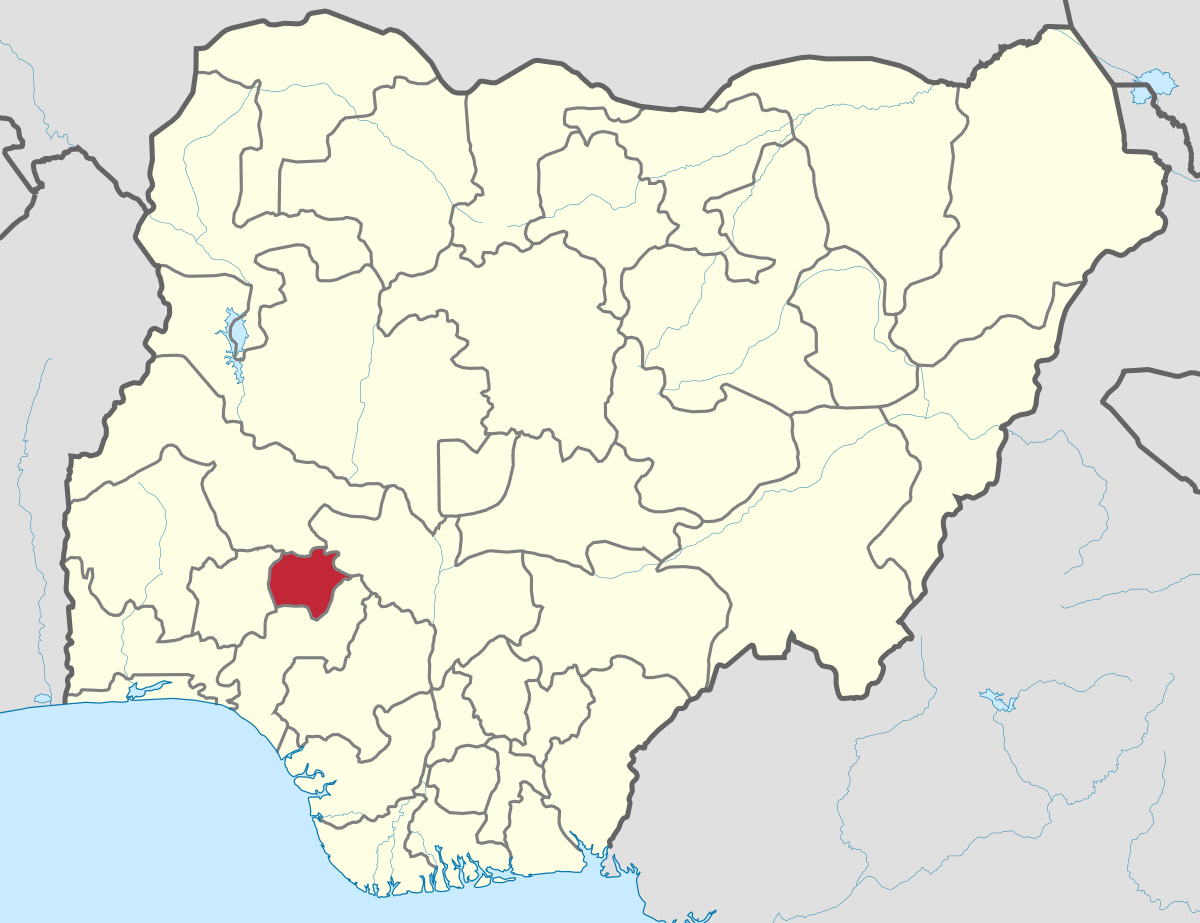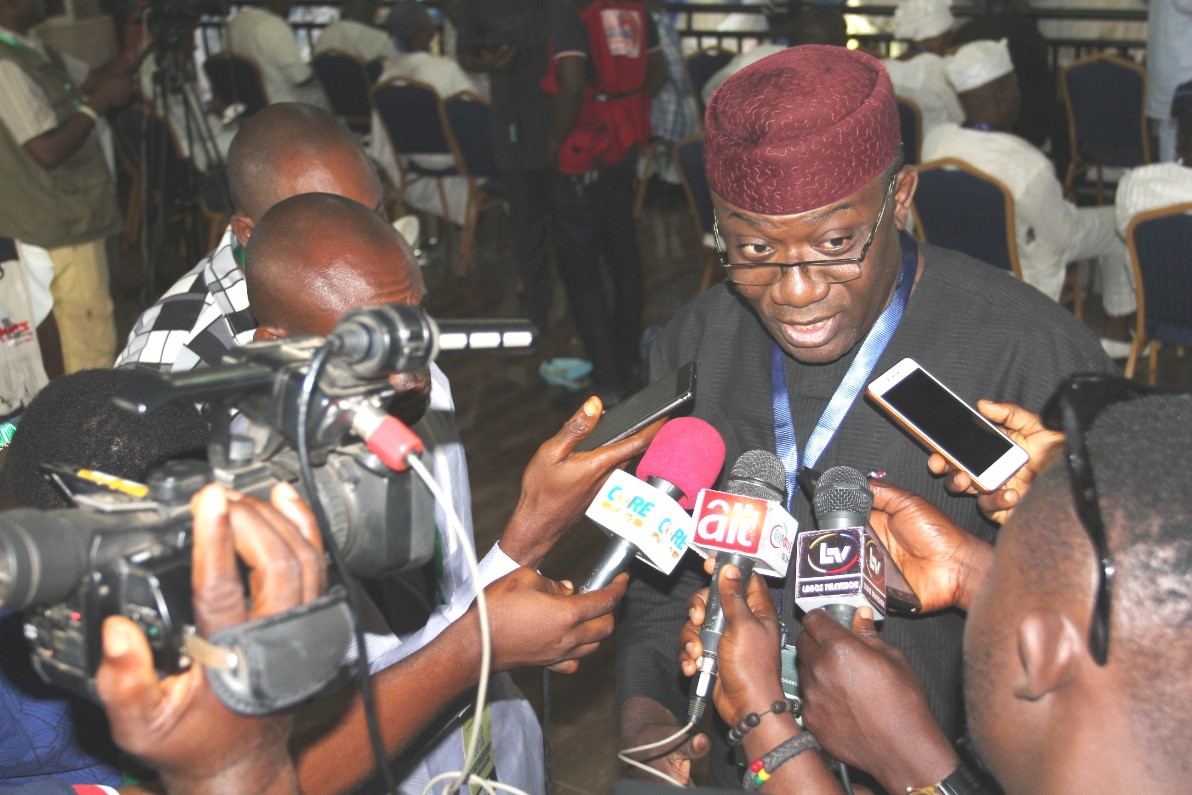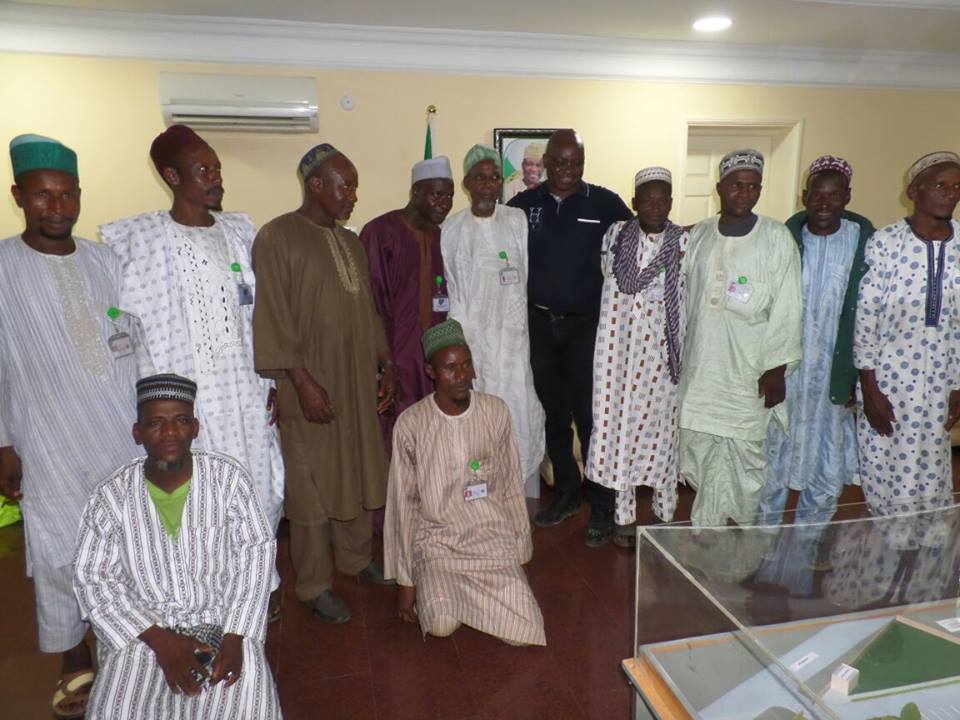Feature/OPED
Ekiti State A Toddler @ 25? Nope. Objection My Lord!

By John Ajayi
Recently, Ekiti State celebrated 25 years of its creation by the then military junta of late General Sani Abacha. Coincidentally, the celebration which continues to generate excitement and euphoria amongst the citizens of the state appears to be a foretaste of the huge celebration in the work for the third year anniversary of the administration of Dr John Olukayode Fayemi.
As usual, this epochal event has drawn unwarranted flaks from some critical elements and stakeholders in the state. Indeed these criticisms are not unexpected, especially in a democratic society and more importantly, given the different political leanings and ideological configuration of these personalities and stakeholders.
Aside from the fact that the constitution of the Federal Republic of Nigeria guarantees everyone the right and freedom of speech, it is an indisputable fact of life that there will always be divergent views amongst the citizens of the state notwithstanding its homogenous nature.
Not only that, the state which boasts of the highest population of highly educated people with a historic record of renowned PhD holders and seasoned lawyers, professionals and accomplished technocrats, the issue of governance and leadership contestation cannot but become a matter for critical review and evaluation. This is also coming against the backdrop of the fact that Ekiti indigenes are generally perceived to be fastidious in nature. Here, no negativism is intended about the good-natured people of Ekiti State to which yours truly belongs in flesh and in blood!
Nonetheless rolling out the drums and popping champagne in celebration of 25 years of the creation of the state by the current Executive Governor, Dr John Olukayode Fayemi administration cannot be said to be a mere jamboree nor a misplaced priority. Ordinarily, age 25 has come to be recognised universally as a landmark epoch in the life of individuals, institutions, organisations, states or nations. Generally regarded as Silver Jubilee or quadricentennial anniversary, the 25th anniversary of any living being, be it state or human is unarguably a watershed.
However, in evaluating and assessing the state of growth and development of Ekiti State in this near three decades of existence, it will be grossly unfair to assume or outrightly write off the state as a failure. While the state may not have fully lived up to the expectations of its founding fathers, it does not necessarily presuppose that the state has not achieved anything since its creation.
Particularly disappointing, if not completely unfair, on the part of successive administrations of the state is the castigation of the state as a ‘Toddler at 25. Reviewing the state of affairs of Ekiti State in the last 25 years, elder statesman and founder of Afe Babalola University (ABUAD) Ado Ekiti, Aare Afe Babalola had said that Ekiti State had nothing to celebrate. The highly revered lawyer and one of the founding fathers of Ekiti had in a widely published press statement titled ‘Ekiti State A toddler @ 25’ castigated the State as landlocked, airport locked, industry locked, and power locked, adding that all these developments adversely affect economic development in the state.
While the elder statesman reserves the right to express his views and frustrations about the state he contributed to mid-wife, the objective reality on the ground as far as developments are concerned, be it political, economic social or whatever does not in any way warrant or justify these assertions and lamentations. This is particularly so because successive administrations in the state have all contributed their own quotas to the growth and development of the state.
Since its creation, October 1, 1996, the state has been administered by both military and civilian administrators each with its own unique style and approach to governance. Like an organic being, Ekiti State is clearly still a work in progress. For a fact, the founding fathers of the state may have had a utopian perception of the developments to expect within a particular time frame, the actual reality about governance may not and cannot be said to be the same with the imaginations and expectations of the founding fathers.
This is not to say that there are no shortcomings on past and present political leaders and administrators of the state. Indeed, this cannot be said to be an unusual development as it is a phenomenon in underdeveloped, developing and developed nations. For those who may not know, the present administration of Governor Kayode Fayemi has done significantly well in positioning the state well above its peers when it comes to development in all aspects and ramifications. Feelers emanating from the state revealed that the JKF administrations which will soon kick-start activities marking the third year of his second term tenure were not planning any jamboree other than projects commissioning and new projects unveiling.
Like all humans, Dr Kayode Fayemi may have his shortcomings, it is indisputable that he remains a blessing and a gift to the state not only as the current Chief Executive Officer of the State but also a very good ambassador of Ekiti State as a major political actor on both national and global political space. His tenure so far as Chairman of the Nigerian Governors Forum (NGF) bears eloquent testimony to his intellectual sagacity and political wizardry. For JKF, the former United States Supreme Court Justice Oliver Wendell Holmes appeared right and justifiable in his famous and immortal quote when he said: “there are people who make things happen, and there are people who watch what’s happening and there are people who have not the slightest idea what’s happening”.
So far, an objective review of past administrations in Ekiti will readily confirm the fact that Dr John Olukayode Fayemi is a leader who makes things happen and indeed has great ideas of what is happening and must happen. Since he took the mantle of leadership in the State, he has made strategic thinking the cornerstone of governance and policy direction. As a consummate politician with a progressive hue, JKF’s approach to governance has been anchored on the greater good for the greater number of his people.
The views of statesmen like Chief Deji Fasuan, former Governor Segun Oni, Senator Opeyemi Bamidele, Biodun Oyebanji, and others, were in sync with the position earlier canvassed by Governor Fayemi that Ekiti has not failed in any way in the pursuit of its development agenda.
If truth be told, in the last three years, Fayemi’s government has attracted over $100 million in investments to the state. Under this present economy, this is no mean feat and couldn’t have been regarded as a failure by any standard.
It can be appreciated that only the apolitical, who periscopes issues with unbiased spectacle could recognise and flaunt this enigmatic scorecard.
One fact must be reflected here; in 1996, Ado Ekiti city as called then, was like a glorified village without the modern touch. Today, all the major dualization of the road in Ado Ekiti done cumulatively by the administrations of Governors Fayemi, Segun Oni and Ayodele Fayose like Basiri-Ijigbo-Ajilosun, Ijigbo-Ilawe road, Post Office-Irona and Ado-Ifaki, couldn’t have been undertaken, if the state had not been created. Akure, the Ondo State capital, could have been taken as the development fulcrum, where things would be anchored and concentrated.
The new Governor’s Offices at Oke Bareke, the Secretariat at the new Iyin Road, Trade Fair Complex, Ekiti Parapo Pavilion and other government structures in Ado Ekiti metropolis, are clear evidence of modernity and gradual face-lifting of the town.
Let me also state that before 1996, Ekiti had no functional state-owned industry. The ROMACO granite company at Igbemo, Ikun Dairy farm at Ikun, Ire Burnt Brick at Ire Ekiti and Orin Farm settlement at Orin Ekiti, were all moribund. But with shrewd and dexterous management by Fayemi, the derelict companies are bouncing back to reckoning.
For Ikun Dairy farm to be revamped, the government, in partnership with Promasidor Nigeria Limited, spent a sum of $5 million to import cows and purchased other machines. At an optimal production level, the company will produce 10,000 litres of milk daily. This will go a long way in generating employments and fortify the State’s revenue profile.
Deploying his nexus with the international community, Governor Fayemi had partnered with private companies to manage the ROMACO and Ikun Dairy Farm for effective management and they are gradually being revamped.
One of the catalysts of good governance is a functional and robust local government structure. When the third tier of government is closer, it makes development spiral and gains traction.
Before 1996, Ekiti had six local governments of Ero, Ekiti East, Ekiti South, Ekiti North, Ekiti Central and Ijero. But the tally had increased to 16 statutorily recognised councils, with 19 Local Council Development Authorities established to midwife and propel development pedal at the grassroots.
In 2011, the government of President Goodluck Jonathan established 12 new Universities across the nation, with Ekiti being a beneficiary by the approval given for the establishment of the Federal University, Oye Ekiti in the state. The concept behind this was to ensure balancing so that each state could have a federal University.
It is an unassailable fact that Ekiti couldn’t have benefited from this lofty gesture if it is still subsumed under Ondo, this was because the Federal University, Akure had been in existence for decades. In a few months’ time, work would also begin on the approved Federal Medical University in Iyin Ekiti after receiving presidential assent.
As parlous and feeble as Ekiti seems to be in the area of economy, the state gets an average of N3.5 billion from the federation account monthly. These monies are expended on education, health, agriculture, human capital development and other pivotal sectors. Would it have been possible for Ondo to earmark a staggering sum of N3.5 billion on projects in Ekiti axis monthly if Ekiti still retains the six local governments which we had then? This also signifies another area of benefit that should be taken into cognisance.
This came to the fore because of the fact that Ekiti gave Governor Fayemi the veritable gubernatorial platform to prove his mettle and worth. Let the sceptics rummage the history books; no Ekiti man had ever been touted for such a coveted seat.
Added to that was the fact that Governor Fayemi is the Chairman, Nigeria’s Governors Forum, superintending over the affairs of the 36 Governors across party lines and divides. These are records that lend credence to the fact that Ekiti has gained reckoning not only as of the most educated but also as a politically sophisticated and conscious set of people.
John Ajayi is a public affairs commentator and a Lagos based journalist
Feature/OPED
Dangote, Monopoly Power, and Political Economy of Failure

By Blaise Udunze
Nigeria’s refining crisis is one of the country’s most enduring economic contradictions. Africa’s largest crude oil producer, strategically located on the Atlantic coast and home to over 200 million people, has for decades depended on imported refined petroleum products. This illogicality has drained foreign exchange, weakened the naira, distorted investment incentives, and hollowed out state institutions. Instead of catalysing industrialisation, Nigeria’s oil wealth became a mechanism for capital flight, rent-seeking, and institutional decay.
With the challenges surrounding the refining of crude oil, the establishment of Dangote Refinery signifies an important historic moment. The refinery promises to reduce fuel imports to a bare minimum, sustain foreign exchange growth, ensure there is constant fuel domestically, and strategically position Nigeria as a regional exporter of refined oil products if functioned at full capacity. Dangote Refinery symbolises what private capital, technology, and ambition can achieve in Africa following years of fuel queues, subsidy scandals, and global embarrassment.
Nigerians must have a rethink in the cause of celebration. Nigeria’s refining problem is not simply about capacity; it is about systems. Without addressing the policy failures and institutional weaknesses that made Dangote an exception rather than the rule, the country risks replacing one failure with another, this time cloaked in private-sector success.
For a fact, Nigeria desperately needs the emergence of Dangote refinery, and its success is in the national interest. Hence, this is not an argument against the Dangote Refinery. But history warns that structural failures are not solved by scale alone. Over the year, situations have shown that without competition and strong institutions, concentrated market power, whether public or private, can undermine price stability, energy security, and consumer welfare.
The Long Silence of Refinery Investments
Perhaps the most troubling question in Nigeria’s oil history is why none of the global oil majors like Shell, ExxonMobil, Chevron, Total, or Agip has built a major refinery in Nigeria for over four decades. These companies operated profitably in Nigeria, extracted their crude, and sold refined products back to the country, yet never committed capital to domestic refining.
Over the period, it has been shown that policy incoherence has been the cause, not a matter of technical incapacity, such as price controls, resistant licensing processes, subsidy arrears, frequent regulatory changes, and political interference, which made refining an unattractive investment. Importation, by contrast, offered quick returns, lower political risk, and guaranteed margins, often backed by government subsidies.
Nigeria carelessly designed a system that rather rewarded importers and punished refiners. Dangote did not succeed because the system improved; he succeeded despite it. His refinery exists largely because of the concessions from the government, exceptional financial capacity, political access, and a willingness to absorb risks that institutions should ordinarily mitigate. This raises a deeper concern; when institutions fail, progress becomes dependent on extraordinary individuals rather than predictable systems.
The Tragedy of NNPC Refineries
If private investors stayed away, Nigeria’s state-owned refineries should have filled the gap. Instead, the Port Harcourt, Warri, and Kaduna refineries became monuments to mismanagement. Records have shown that between 2010 and 2025, Nigeria reportedly wasted between $18 billion and $25 billion, over N11 trillion, just for Turn Around Maintenance and rehabilitation. Kaduna Refinery alone is estimated to have consumed over N2.2 trillion in a decade.
Despite these expenditures, output remained negligible. This was not merely a technical failure but a governance one. Contracts were poorly monitored, accountability was absent, and consequences were nonexistent. In functional systems, such outcomes trigger investigations, sanctions, and reforms. In Nigeria, the cycle simply repeated itself, eroding public trust and deepening dependence on imports.
Where Is BUA?
Dangote is not the only Nigerian conglomerate to announce refinery ambitions. In 2020, BUA Group unveiled plans for a 200,000-barrels-per-day refinery. Years later, progress remains unclear, timelines have shifted, and execution appears stalled.
This pattern is revealing. When multiple large investors struggle to translate plans into reality, the issue is not ambition but environment. Refinery projects in Nigeria appear viable only at a massive scale and with extraordinary political leverage. Smaller or mid-sized players are effectively crowded out, not by market forces, but by systemic dysfunction.
Policy Failure and the Singapore Comparison
Nigeria often aspires to emulate Singapore’s refining and petrochemical success. The comparison is instructive. Singapore has no crude oil, yet built one of the world’s most sophisticated refining hubs through consistent policy, investor protection, infrastructure planning, and regulatory certainty.
Nigeria chose a different path: price controls, subsidies, weak contract enforcement, and politically motivated policy reversals. Refineries became tools of patronage rather than productivity. Capital exited, infrastructure decayed, and import dependence deepened. The outcome was predictable.
The Cost of Import Dependence
For years, Nigeria spent billions of dollars annually importing petrol, diesel, and aviation fuel. This placed constant pressure on foreign reserves and the naira. Petrol subsidies alone were estimated at N4-N6 trillion per year, often exceeding national spending on health, education, or infrastructure.
Even after subsidy removal, legacy costs remain: distorted consumption patterns, weakened public finances, and entrenched interests built around importation. These interests did not disappear quietly.
Who Really Benefited from the Subsidy?
Although framed as pro-poor, fuel subsidies disproportionately benefited importers, traders, shipping firms, depot owners, financiers, and politically connected intermediaries. Smuggling across borders meant Nigerians subsidised fuel consumption in neighbouring countries.
Ordinary citizens received marginal relief at the pump but paid far more through inflation, deteriorating infrastructure, and underfunded public services. The subsidy system functioned less as social protection and more as elite redistribution.
The Traders’ Dilemma
Why did major fuel marketers like Oando invest in refineries abroad but not in Nigeria? Again, incentives explain behaviour. Importation offered faster returns, lower capital requirements, and political insulation. Domestic refining demanded long-term investment under unstable rules.
In an irrational system, rational actors optimise accordingly. Importation thrived not because it was efficient, but because policy made it so.
FDI and the Confidence Problem
Sustainable Foreign Direct Investment follows domestic confidence. When local investors, who best understand political and regulatory risks, avoid long-term industrial projects, foreign investors take note. Capital flows to environments with predictable pricing, rule of law, and policy consistency.
Nigeria’s challenge is not attracting speculative capital, but building conditions for patient, productive investment.
Dangote and the Monopoly Question
Dangote Refinery deserves credit. But scale brings power, and power demands oversight. If importers exit and no competing refineries emerge, Dangote could dominate refining, pricing, and supply. Nigeria’s experience with cement, where domestic production rose but prices soared due to limited competition, offers a cautionary tale.
Markets function best with competition. Without it, price manipulation, supply risks, and weakened energy security become real dangers, especially in countries with fragile regulatory institutions.
The Way Forward: Competition, Not Replacement
Nigeria does not need to weaken Dangote; it needs to multiply Dangotes. The goal should be a competitive refining ecosystem, not a replacement of a public monopoly with a private monopoly.
This requires transparent crude allocation, open access to pipelines and storage, fair pricing mechanisms, and strong antitrust enforcement. State refineries must either be professionally concessional or decisively restructured. Stalled projects like BUA’s should be unblocked, and modular refineries should be supported.
The Litmus Test
Nigeria’s refining crisis was decades in the making and cannot be solved by one refinery, however large. Dangote Refinery is a turning point, but only if embedded within systemic reform. Otherwise, Nigeria risks trading one form of dependency for another.
The true test is not whether Nigeria can refine fuel, but whether it can build fair, open, and resilient institutions that serve the public interest. In refining, as in democracy, excessive concentration of power is dangerous. Competition remains the strongest safeguard.
Blaise, a journalist and PR professional, writes from Lagos and can be reached via: [email protected]
Feature/OPED
How AI Levels the Playing Field for SMEs

By Linda Saunders
Intro: In many small businesses, the owner often starts out as the bookkeeper, the customer-service desk, the IT technician and the person who steps in when a delivery goes wrong. With so many balls up in the air – and such little room for error – one dropped ball can derail the entire day and trigger a chain of problems that’s hard to recover from. Unlike larger companies that have the luxury of spreading the load across dedicated teams and systems, SMEs carry it all on a few shoulders.
South Africa’s SME sector carries significant weight, contributing around 19% of GDP and a third of formal employment, according to the latest available Trade & Industrial Policy Strategies (TIPS) 2024 review. That is causing persistent constraints, including tight margins, erratic demand, high administrative load, and limited internal capacity.
This is not unique to South Africa. Many smaller businesses across the continent still rely on manual processes. It is common to find sales records kept separately from customer notes, or inventory data that is updated only occasionally. The result is slow turnaround times, duplicated effort and a lack of visibility across the business. Given that SMEs have such a huge influence on national economies, accounting for over 90% of all businesses, between 20-40% of GDP in some African countries, and a major source of employment, providing around 80% of jobs, these operational constraints have a broad impact on economies.
What has changed in recent years is that digital tools once seen as the preserve of larger companies have become more attainable for smaller operators. They do not remove the structural challenges SMEs face, but they can ease the load. Better systems do not replace judgement, experience or customer relationships; they simply give small companies more room to work with.
Cloud-based systems, automation and integrated customer-management tools have become more affordable and easier to deploy. They do not remove the structural pressures facing small businesses, but they can ease the operational load and create more space for productive work.
Doing more with the teams SMEs already have
Small teams often end up wearing several hats. One person might take customer calls, update stock records, handle service issues and manage follow-ups. When demand rises, these manual processes become harder to sustain. Local surveys regularly point to this strain, showing that smaller companies spend significant portions of the week on paperwork, compliance and routine administrative tasks – work that adds little value but cannot be ignored.
This is where automation is proving useful. Routine tasks such as onboarding new customers, checking documents, routing queries to the right person, logging interactions and sending follow-ups can now run quietly in the background. In larger companies, whole departments handle this work. In small businesses, the same burden has traditionally fallen on one or two people. When these processes run reliably without constant attention, a business with 10 employees can manage busier periods without rushed outsourcing or slipping service standards.
The point is not to replace staff, but to reduce the operational drag that limits what small teams can deliver. Structured workflows give SMEs a level of steadiness they have rarely had the time or money to build themselves.
Using better data to make better decisions
A second constraint facing SMEs is disorganised information. When customer details are lost in email, sales notes in chat groups, stock figures in spreadsheets and queries in separate systems, decisions depend on whatever information happens to be at hand. Forecasting becomes guesswork, and early warning signs are easy to miss.
Putting all this information in a single place changes the quality of decision-making. When sales, service and stock data can be viewed together, patterns become easier to spot: which products are moving, which customers are becoming less active, where delays tend to occur, and which periods consistently drive higher demand.
Importantly, SMEs do not need corporate analytics teams for this. Modern CRM platforms can organise information automatically and surface basic trends. For retailers preparing for 2026, this can help avoid over – or under – stocking. For service businesses, it can highlight customers who may be at risk of leaving, prompting earlier intervention. In competitive markets, having clearer information is a practical advantage.
Building a foundation before the pressure arrives
Rapid growth can be as destabilising for SMEs as an economic downturn. When orders increase, manual processes quickly reach their limit. Errors are more likely, staff become overwhelmed and the customer experience suffers. Many small businesses only upgrade their systems once these problems appear, by which time the cost, both financial and reputational, is already significant.
Putting basic workflow tools and a unified customer record in place early provides a useful buffer. Tasks follow the same steps every time, reducing inconsistency. Customers reach the right person more quickly. Staff spend less time checking or re-entering information and more time on work that matters. These small operational gains compound over time, especially during busy periods.
This is not about chasing every new technology. It is about avoiding a common pattern in the SME sector: when demand rises, systems buckle, and growth becomes more difficult.
Confidence matters as much as capability
Smaller companies understandably worry about risk when adopting new systems. Data protection, monitoring, and compliance can feel daunting without an IT department. The advantage of modern platforms is that many of these protections, like encryption, audit trails, and event monitoring, are built in. Transparent design also helps SMEs understand how automated decisions are made and how customer data is handled.
This reassurance is important because SMEs should not have to choose between improving their operations and protecting their customers’ information.
2026 will reward readiness
Technology will not replace the qualities that give SMEs their edge: personal service, flexibility, and the ability to respond quickly to customer needs. What it can do is relieve the administrative load that prevents those strengths from being fully used.
SMEs that invest in simple automation and better data practices now will enter 2026 with greater capacity and clearer insight. They won’t be competing with larger companies by matching their resources, but by removing the disadvantages that have traditionally held them back.
In the year ahead, the most competitive businesses will not be the biggest; they’ll be the ones that prepared early for the year ahead.
Linda Saunders is the Country Manager & Senior Director Solution Engineering for Africa at Salesforce
Feature/OPED
Why Africa Requires Homegrown Trade Finance to Boost Economic Integration

By Cyprian Rono
Africa’s quest to trade with itself has never been more urgent. With the African Continental Free Trade Area (AfCFTA) gaining momentum, governments are working to deepen intra-African commerce. The idea of “One African Market” is no longer aspirational; it is emerging as a strategic pathway for economic growth, job creation, and industrial competitiveness. Yet even as infrastructure and regulatory reforms advance, one fundamental question remains; how will Africa finance its cross-border trade, across markets with diverse currencies, regulations, and standards?
Today, only 15 to 18 percent of Africa’s internal trade happens within the continent, compared to 68 percent in Europe and 59 percent in Asia. Closing this gap is essential if AfCFTA is to deliver prosperity to Africa’s 1.3 billion people.
A major constraint is the continent’s huge trade finance deficit, which exceeds USD 81 billion annually, according to the African Development Bank. Small and medium-sized enterprises (SMEs), which provide more than 80 percent of the continent’s jobs, are the most affected. Many struggle with insufficient collateral, stringent risk profiling and compliance requirements that mirror international banking standards rather than the realities of African business.
To build integrated value chains, exporters and importers must operate within trusted, predictable, and interconnected financial systems. This requires strong pan-African financial institutions with both local knowledge and continental reach.
Homegrown trade finance is therefore indispensable. Pan-African banks combine deep domestic roots with extensive regional reach, making them the most credible engines for financing trade integration. By retaining financial activity within the continent, homegrown lenders reduce exposure to external shocks and keep liquidity circulating locally. They also strengthen existing regional payment infrastructure such as the Pan-African Payment and Settlement System (PAPSS), developed by the Africa Export-Import Bank (Afreximbank) and backed by the African Continental Free Trade Area (AfCFTA) Secretariat, enabling faster, cheaper and seamless cross-border payments across the continent.
Digital transformation amplifies this advantage. Real-time payments, seamless Know-Your-Customer (KYC) verification, automated credit scoring and consistent service delivery across markets are essential for intra-African trade. Institutions such as Ecobank, operating in 34 African countries with integrated core banking systems, demonstrate how such digital ecosystems can enable continent-wide commerce.
Platforms such as Ecobank’s Omni, Rapidtransfer and RapidCollect, together with digital account-opening services, make it much easier for traders to operate across borders. Rapidtransfer enables instant, secure payments across Ecobank’s 34-country network, reducing delays in regional trade, while RapidCollect gives cross-border enterprises the ability to receive payments from multiple African countries into a single account with real-time confirmation and automated reconciliation. Together, these solutions create an integrated digital ecosystem that lowers friction, accelerates payments, and strengthens intra-African commerce.
Trust, however, remains a significant barrier. Cross-border commerce depends on the confidence that partners will honour contracts, deliver goods as promised, pay on time, and present authentic documentation. Traders often lack reliable information on potential partners, operate under different regulatory regimes, and exchange documents that are difficult to verify across borders. This heightens the risk of fraud, non-payment, and contractual disputes, discouraging businesss from expanding beyond familiar markets.
Technology is closing this trust gap. Artificial Intelligence enables lenders to assess risk using alternative data for SMEs without formal credit histories. Distributed ledger tools make shipping documents, certificates of origin, and inspection reports tamper-proof. In addition, supply-chain visibility platforms enable real-time tracking of goods and cross-border digital KYC ensures that both buyers and sellers are verified before any transaction occurs.
Ecobank’s Single Trade Hub embodies this trust infrastructure by offering a secure digital marketplace where buyers and sellers can trade with confidence, even in markets where no prior relationships exist. The platform’s Trade Intelligence suite provides customers instant access to market data from customs information and product classification tools across 133 countries.
Through its unique features such as the classification of best import/export markets, over 25,000 market and industry reports, customs duty calculators, and local and universal customs classification codes, businesses can accurately assess market opportunities, anticipate trends, reduce compliance risks, and optimise supply chains, ultimately helping them compete and grow in regional and global markets.
SMEs need more than financing. Many operate in cash-heavy cycles where suppliers and logistics providers require upfront payment. Lenders can support these businesses with advisory services, business intelligence, compliance guidance, and platforms for secure partner verification, contract negotiation, and secure settlement of payments. Trade fairs, industry forums, and partnerships with chambers of commerce further build the trust networks needed for cross-border trade.
Ultimately, Africa’s path toward meaningful trade integration begins with financial integration. AfCFTA’s promise will only be realised when enterprises can trade with confidence, knowing that payments will be honoured, partners verified, and disputes resolved. This requires collaboration between banks, regulators, and trade institutions, alongside harmonised financial regulations, interoperable payment systems, and continent-wide verification networks.
Africa can no longer rely on external actors to finance its trade. Its economic transformation depends on strong, trusted, and digitally enabled African financial institutions that understand Africa’s unique risks and opportunities. By building an African-led trade finance ecosystem, the continent can unlock liquidity, reduce dependence on external currencies, empower SMEs, and retain more value locally. Africa’s trade revolution will accelerate when its financing is driven by African institutions, African systems, and African ambition.
Cyprian Rono is the Director of Corporate and Investment Banking for Kenya and EAC at Ecobank Kenya
-

 Feature/OPED6 years ago
Feature/OPED6 years agoDavos was Different this year
-
Travel/Tourism9 years ago
Lagos Seals Western Lodge Hotel In Ikorodu
-

 Showbiz3 years ago
Showbiz3 years agoEstranged Lover Releases Videos of Empress Njamah Bathing
-

 Banking7 years ago
Banking7 years agoSort Codes of GTBank Branches in Nigeria
-

 Economy3 years ago
Economy3 years agoSubsidy Removal: CNG at N130 Per Litre Cheaper Than Petrol—IPMAN
-

 Banking3 years ago
Banking3 years agoFirst Bank Announces Planned Downtime
-

 Banking3 years ago
Banking3 years agoSort Codes of UBA Branches in Nigeria
-

 Sports3 years ago
Sports3 years agoHighest Paid Nigerian Footballer – How Much Do Nigerian Footballers Earn
















